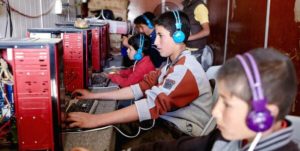Gaming a help for refugee kids
Video games could be instrumental in helping refugee children by improving language skills and mental health, according to a new study.
Researchers from New York University (NYU) and Bahcesehir University (BAU) recently finished studying an online gaming program they implemented called ‘Project Hope’, aimed at tackling the challenges faced by Syrian refugee children in Urfa, Turkey, home to the largest population of refugees in Turkey.
Although enrolments are rising, more than 40 per cent of Syrian refugees in Turkey were not attending school, a survey in January last year conducted by Human Rights Watch found.
 This lacking of access to education is exacerbated by language barriers, financial hardship, and mental health challenges, the study found.
This lacking of access to education is exacerbated by language barriers, financial hardship, and mental health challenges, the study found.
Seventy-nine percent of Syrian children refugees have experienced a death in their family, and almost half display symptoms of post-traumatic stress disorder, the research found.
“That’s 10 times larger than what you would expect from a generalized population,” NYU researcher Selcuk Sirin said.
Globally, 5 million people, about half of whom are children, have fled the civil war in Syria, according to mid-2017 United Nations estimates.
Turkey has registered three million Syrian refugees, and continues to host more refugees globally than any country in the world. While about 90 per cent of children living in Turkey’s 25 government-run refugee camps can attend school, only 25 per cent of children who do not live in refugee camps can attend school, according Human Rights Watch.
The researchers have been looking at how to help refugee children like those in Turkey for several years, but was inspired to think about how to leverage technology as he watched his own two children playing video games at home. He believes this study is at the frontier of using gaming technologies to help refugee children.
To study the effectiveness of using online resources to help alleviate these challenges, the Project Hope researchers used a variety of games to help children cope with language barriers and improve their mental health.
The children used several games, including Minecraft, a coding-education program from Code.org, a game called Alien Game, and a Turkish language game designed with the Cerego engine. 147 Syrian children between the ages of nine and 14 were participants in the study.
About half the children were in a control group, and half were assigned the gaming intervention program.
Vital to the project were local non-government organisations that helped provide lunch and transportation to the children, as well as assisted in organising the gaming program.
The intervention program used a local municipality building with computers to run several two-hour daily sessions with students over a four week period. Now with evidence of success, the researchers hope to expand the program.
Laurie Nowell
AMES Australia Senior Journalist












